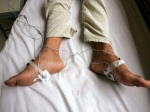 For several years ‘internet addiction’ has been promoted by the Chinese government as a serious mental illness affecting large numbers of young people, but in recent months it has started to pull back, seemingly due to the growth of a widespread, poorly regulated and abusive system of internet addiction ‘treatment’ centres.
For several years ‘internet addiction’ has been promoted by the Chinese government as a serious mental illness affecting large numbers of young people, but in recent months it has started to pull back, seemingly due to the growth of a widespread, poorly regulated and abusive system of internet addiction ‘treatment’ centres.
Firstly, let me say that most of my sources on this issue are from China Daily, a state-run news service, but whether this reflects the reality or not, it is clear that the Chinese authorities are becoming worried about how the problem is being dealt with.
For example, the Chinese authorities recently shut down an unlicensed internet ‘boot camp’ style clinic and arrested 13 employees after a 15-year-old boy was beaten to death by camp counsellors for apparently running too slowly.
This follows news that the Chinese Ministry of Health has recently banned electroshock therapy for ‘internet addiction’. The same state media source reported that in Linyi Psychiatric Hospital alone, 3,000 young people had been ‘treated’ in this way. Both Chinese and Western media report that electroshock was also used as a punishment (note that some reports portray it as mild electrical current while others specifically describe it as electroconvulsive therapy).
The clinics seems to be a mixture of private clinics, of which 400 or so are estimated to exist, and government run clinics of an indeterminate number.
The approach of one of the most prestigious state-run clinics is described in this article:
Co-founded by the Central Committee of the Communist Youth League of China and Beijing Military Region General Hospital in 2004, Tao’s clinic in the suburbs of Beijing has treated nearly 5,000 Internet-addicted youths and says 75 percent have been cured.
At the clinic, young addicts receive “comprehensive therapy” including medication, psychological counseling and low-intensity military training. They also take interactive courses with their parents to learn communication skills.
Tao also uses psychotropic drugs to treat patients suffering from mental illnesses such as attention deficit hyperactivity disorder, anxiety and depression.
This clinic seems to be the only one to have admitted Western journalists and it has been featured in TV and radio news reports, which, at times, make for quite disturbing viewing.
The recent admission of abuses in ‘internet addiction’ treatment centres is a significant change in tack as previous reports have typically discussed the internet in rather alarming terms, variously claiming that it has caused schizophrenia, led to drug addiction, resulted in job loss and the like. State media claims that about 10% of young net users are addicts.
Reading all the stories on ‘internet addiction’ in China, both from Chinese and Western media, I was struck by how it consistently reflected the idea that the popularity of the ‘treatment’ is being driven by parents’ anxieties about their children not conforming to the social pressures of family and academic achievement.
This is remarkably similar to what seems to drive the concept in the Western world and while our stereotype can often be that ‘internet addiction’ is simply a tool of Chinese state repression of free speech, it is worth bearing in mind that it may be closer to home than we like to believe.
Link to TV news report on ‘internet addiction’ in China.
Link to China Daily on shut down of illegal clinics.